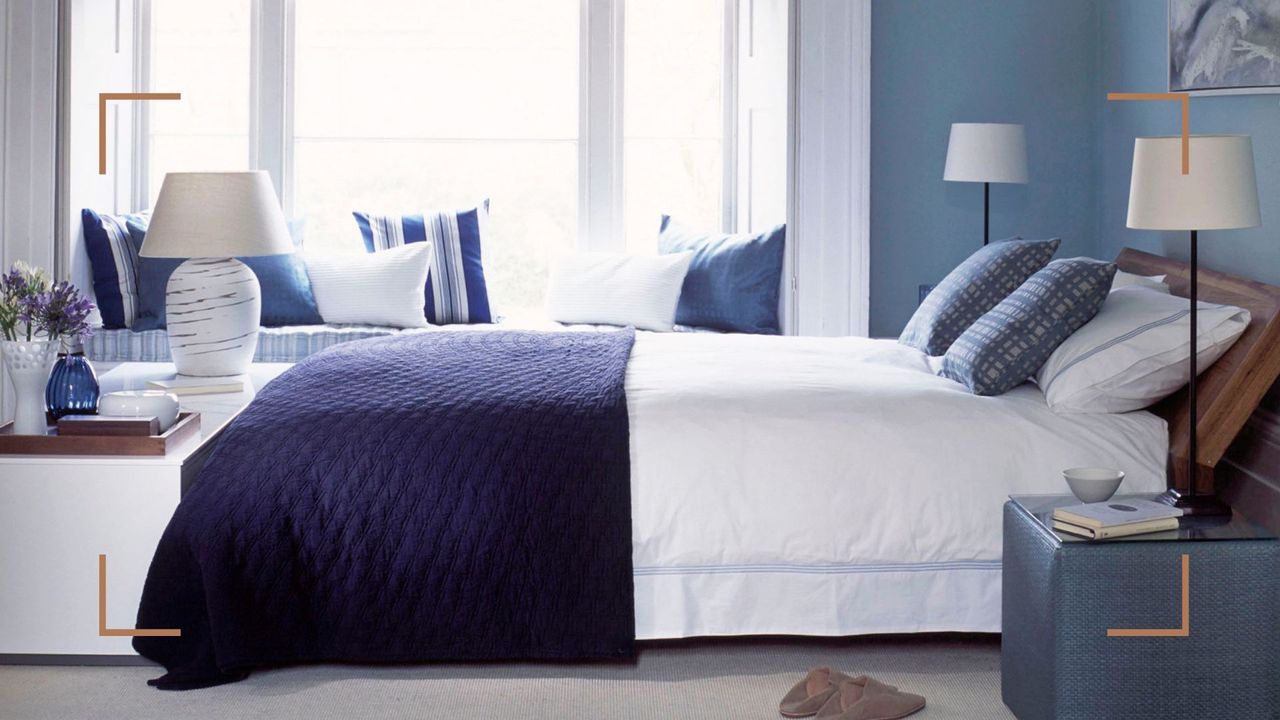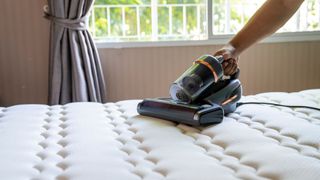5 tell-tale signs you need to replace your mattress, according to sleep experts
Is your mattress showing these signs of wear and tear? If so, it might be time to invest in a new one


When it comes to sleep it's important to make sure we're well supported and in the best position to get good quality rest. So if you're starting to notice yourself waking up feeling less than refreshed, your mattress might be the reason.
It's no secret that a good-quality mattress equals a better night's sleep. But what we often forget is that mattresses don't last forever, and after time they begin to offer less comfort and support.
Many perhaps don't know how often you should change your mattress, but luckily bed and sleep experts share all the tell-tale signs that yours likely needs replacing.
5 signs you need to replace a mattress: advised by experts
Even when you invest in one of the best mattress toppers money can buy, your mattress underneath will still suffer from usual wear and tear. This means that over the years you'll start to notice it's not doing its job as well as it used to do when you first bought it.
Generally speaking, mattresses are built to last between seven to ten years, but sometimes they need replacing sooner – if they no longer suit your needs. "One of the clearest signs is visible wear and tear," says Ian Atkins, Mattress Technologist at Simba.
"Think sagging, lumps or dips that throw off your comfort. These uneven areas - and the inability to distribute weight evenly - can disrupt your sleep and leave you tossing and turning at night.
But what about the less obvious signs? Here are the five most common signs that your mattress is on its last legs and needs replacing – then you'll need expert advice on what you need to know before buying a new mattress.
Sign up for the woman&home newsletter
Sign up to our free daily email for the latest royal and entertainment news, interesting opinion, expert advice on styling and beauty trends, and no-nonsense guides to the health and wellness questions you want answered.

Ian is a mattress technologist for the leading mattress brand Simba, it's his job to determine what makes a mattress provide the highest level of comfort and support.
1. You wake up feeling sore

When you prioritise sleep hygiene you should be waking up feeling well rested and energised. However, if you find yourself feeling worse than when you went to sleep, your mattress may no longer be doing its job of keeping you properly supported and comfortable.
Harry Honey, a sports sleep specialist explains, "When the springs, foam or natural fibres are repeatedly compressed they will lose their rebound capacity meaning the support of your body will become uneven. Spinal alignment is the priority for your body, hence it will compensate for the worn support by putting more pressure and tension in other parts of your body. This is why you wake up feeling sore."

Harry is a sleep expert who specialises in sports consulting. He works with athletes to help them find mattresses, bedding, and a sleep routine that optimises their health. He's worked with top-seed tennis players and world-leading Formula 1 drivers for nearly five years and has also recently reviewed a number of mattresses for us.
2. You can feel and hear your partner moving
If you haven't yet opted for the Scandinavian sleep method then chances are you might share a bed with your partner. Whilst this might usually not be an issue, a sudden feeling of disruption from them could mean your mattress isn't supporting you both.
"Another sign is if you can hear your partner moving around much more than usual," says Rebecca Swain, the mattress expert at Winstons Beds. "Good quality mattresses absorb motion transfer so if it feels like you can hear your partner moving around more in the night, it’s not them being annoying, it could be a sign of poor mattress quality."
The mattress is also designed to absorb motion transfer so if you can feel your partner moving through the night more than usual then chances are your mattress isn't absorbing correctly anymore.
3. Your allergies have worsened

If you have bad allergies, you'll probably be on top of vacuuming your mattress and ensuring your room stays as dust-free as possible. And whilst mastering how to dust your bedroom will help, the age of your mattress can be to blame for worsening allergies.
"Keep an eye on your allergies and if they begin to worsen during the mornings or at nighttime when you’re in your bed. This could indicate a build-up of dust mites and other allergens in your mattress," says Rebecca.
Ian adds: "Older mattresses can also harbour dust mites and allergens, so if you’ve been waking up with sniffles or irritated skin, it might be time to replace your mattress."
4. Noisy springs
If you're trying to make your bedroom feel like a luxury hotel with a cloud-like bed, noisy springs are certainly not a part of that vision.
"You might begin to notice creaks or squeaks from the springs, which suggest the mattress is losing its structure," explains Ian Atkins.
According to Rebecca, in a quality mattress springs should never be noisy or creaky. She says, "If you find your mattress begins to make noises as you move on it then it’s likely that its internal structure is weakening."
5. Frequent headaches after sleeping

You might think that waking up with a groggy head and potentially even a headache might be down to your pillows, but it could actually be your mattress causing it. We do still recommend investing in some of the best pillows as they make a world of difference for your neck and back.
"If the spine is not well aligned due to the mattress not providing even support as a consequence of worn out springs, foam or natural fibres then the body tenses up increasing pressure on other parts of the body," says Harry.
He explains how this pressure can lead to a headache adding, "When a muscle contracts it tightens around the blood vessels that run through it. This restricted blood flow hinders oxygen and nutrient delivery to muscles in this area. When focused around the upper body this results in pain or headache. The tension can lead to a double whammy effect as the discomfort from the strain could manifest itself as a headache too."
FAQ
How do you know if your mattress is causing pain?
How do you know if your mattress is the cause of your discomfort? "If you’re waking up with aches, stiffness, or discomfort, then your mattress could be the culprit," says Ian Atkins. "Pain in your lower back, neck, or shoulders - especially if it improves as the day goes on - can be a sign your mattress isn’t giving you the right support."
"You might also feel sore at pressure points, such as your hips or shoulders if your mattress isn’t distributing your weight evenly. If you notice you feel less pain after sleeping on a different mattress then it’s a strong sign that yours needs replacing."
Never ignore the signs because as Ian explains, "A good mattress should help your body relax and keep you comfortable all night long, so you wake up feeling refreshed and pain-free."
Once you've replaced your lacklustre mattress why not participate in some of this year's bedroom trends? Statement headboards are extremely popular this year and it's a perfect time to pick one out when you're investing in a new mattress.

Emily joined woman&home as a staff writer after finishing her MA in Magazine Journalism from City University in 2023. After writing various health and news content, she now specialises in lifestyle, covering unique cleaning hacks, gardening how-tos, and everything to help your houseplants thrive.
-
 Louise Redknapp's burgundy tights are the between seasons staple for both warmth and trending colour
Louise Redknapp's burgundy tights are the between seasons staple for both warmth and trending colourChoosing bolder tights is one of the easiest ways to accessorise in style - we adore Louise's burgundy pair
By Charlie Elizabeth Culverhouse Published
-
 Katie Holmes' waterproof Sorel boots nailed NYC winter - and they're 30% off today
Katie Holmes' waterproof Sorel boots nailed NYC winter - and they're 30% off todayKatie Holmes effortlessly blended practicality and style when she wore waterproof Sorel boots in 2020 and they're now in the sale
By Emma Shacklock Published
-
 2025's biggest armchair trends: from modern organic shapes to traditional high-back designs
2025's biggest armchair trends: from modern organic shapes to traditional high-back designsLooking to breathe new life into your living room? This year's armchair trends are just thing for the job
By Emily Smith Published
-
 How to get rid of moles in your lawn – deter burrowing pests from the garden without causing harm
How to get rid of moles in your lawn – deter burrowing pests from the garden without causing harmIs your garden filled with unwanted dirt mounds? You might have a mole problem - here's how to solve it safely and humanely
By Emily Smith Published
-
 Laundry expert reveals the unlikely 54p solution for stubborn stains and mould build-up
Laundry expert reveals the unlikely 54p solution for stubborn stains and mould build-upWho would have thought the key to fresh, bacteria-free laundry is hiding in your medicine cabinet?
By Emily Smith Published
-
 Habitat's latest collection offers timeless Sanderson designs at affordable prices – with a charming charitable twist
Habitat's latest collection offers timeless Sanderson designs at affordable prices – with a charming charitable twistCombining Sanderson's expertise in patterns and the inspiration of Britain's best National Trust landscapes this is an exquisite collaboration
By Emily Smith Published
-
 How to cut Monstera aerial roots without causing damage, according to horticulture experts
How to cut Monstera aerial roots without causing damage, according to horticulture expertsEver wondered how to tackle those spidery roots that emerge from your monstera plant? We put it to the experts to share their methods
By Emily Smith Published
-
 8 surprising things you can clean with denture tablets: from toilets to tea-stained mugs
8 surprising things you can clean with denture tablets: from toilets to tea-stained mugsCleaning experts have revealed the inventive ways you can use denture tablets to clean your home for dazzling results
By Emily Smith Published
-
 These simple styling tricks can help sell your home quicker, according to a property director
These simple styling tricks can help sell your home quicker, according to a property directorSelling your home quicker can be as easy as making sure you're displaying these common household items
By Emily Smith Published
-
 Jamie Oliver's genius air fryer tray hack doubles cooking space – in even the smallest models
Jamie Oliver's genius air fryer tray hack doubles cooking space – in even the smallest modelsThe celebrity chef is changing the air fryer game with this one simple tray trick to optimise cooking space
By Emily Smith Published